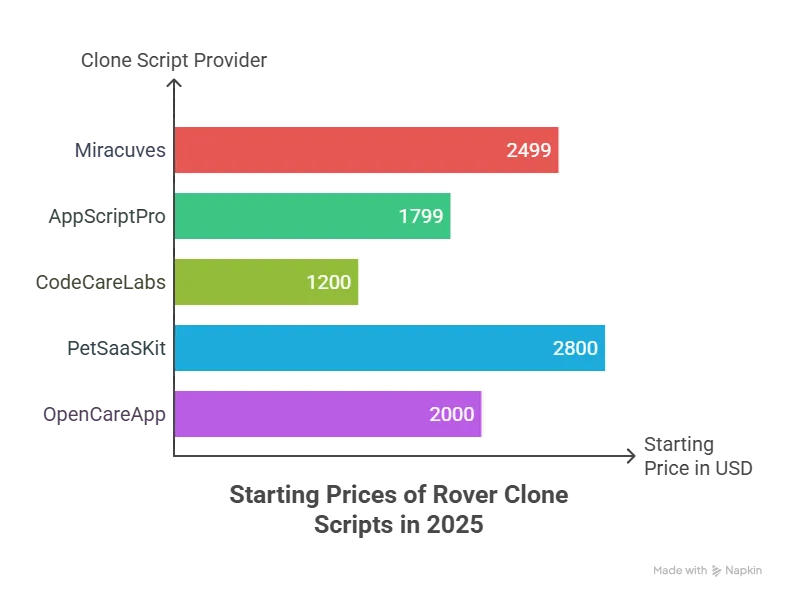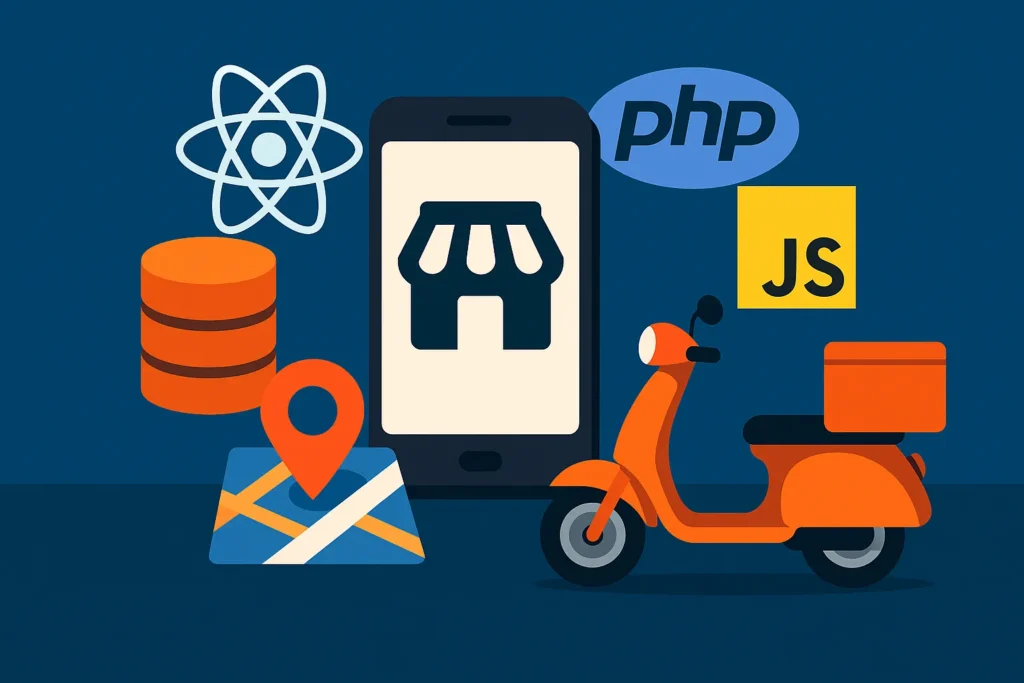A decade ago, if someone needed a sitter for their dog, they’d call a neighbor or maybe leave a key under the mat for a cousin. Fast forward to now, and pet parents treat their four-legged companions like royalty. From dog yoga to gourmet pet food, the pet care industry has gone premium. And that includes how we find walkers, sitters, groomers, and everything in between.
Rover.com carved out a niche by creating a trusted marketplace for pet services—convenient, app-based, and customizable. But just because Rover did it first doesn’t mean they did it all. In fact, 2025 is ripe for platforms that take the Rover model and make it smarter, leaner, and more localized. Think of it as Rover 2.0, with better tech and higher margins.
If you’re an entrepreneur eyeing the booming pet economy, building a Rover clone is more than a smart move—it’s your chance to own a piece of a fast-growing market. And at Miracuves, we’ve seen it all when it comes to clone scripts. Here’s a breakdown of the best Rover clone scripts out there in 2025—by features, pricing, and who they’re really for.
Why Build a Rover Clone App?
Before we dive into the comparisons, let’s talk about why cloning Rover makes sense.
1. Pet Care is a $300 Billion Market
The global pet care market is forecast to hit over $300 billion by 2030. That’s not fluff. This includes services like grooming, pet boarding, dog walking, and even pet taxis.
Trusted source: Statista – Pet Care Market
2. Fragmented Local Demand
Unlike food delivery or ride-sharing, pet care is deeply personal and local. People want to know that their sitter lives nearby and has good reviews. That means there’s space for multiple players in every region.
3. High Retention and Repeat Usage
Pet care isn’t a one-time thing. Users come back weekly, sometimes daily. This boosts lifetime value and reduces churn—two metrics investors love.
4. Minimal Inventory, High Trust Model
You’re not storing pet food or walking the dogs yourself. You’re simply connecting providers to pet owners. That’s an asset-light model with scalable tech at its core.
Read More : How to Develop a Rover Alternative: Smart Way to Tap Into the Pet Services Boom
What to Look for in a Rover Clone Script

Not all clone scripts are created equal. A good Rover clone needs more than a “book now” button. Here’s what separates a serious business tool from a cookie-cutter app:
Must-Have Features
- User & Service Provider Profiles: With bio, photos, ratings, certifications
- Geo-based Matching: Real-time location and distance filters
- Booking & Calendar Integration: Easy scheduling for multiple services
- In-App Payments: Secure and seamless transactions
- Live Chat & Push Notifications: Keep the communication flowing
- Admin Dashboard: Manage users, commissions, analytics
- Review & Ratings System: Builds trust and transparency
Nice-to-Have Upgrades
- Pet Profile Uploads: Include photos, allergies, feeding instructions
- Subscription Plans: For recurring bookings
- Insurance API Integration: For sitter and pet coverage
- AI-Powered Matching: Recommend sitters based on pet type, past bookings
- Loyalty Rewards: Points, discounts, referral bonuses
Read More : Reasons startup choose our rover clone over custom development
Feature Comparison Table: Top Rover Clone Scripts in 2025

| Clone Script Provider | Tech Stack | Key Features | Customizability | Starting Price | Best For |
|---|---|---|---|---|---|
| Miracuves | Laravel + Flutter | End-to-end pet care features, subscription-ready, AI match | High | $2,499 | Entrepreneurs scaling fast |
| AppScriptPro | Node.js + React Native | Basic sitter search, payment integration | Medium | $1,799 | Budget-conscious startups |
| CodeCareLabs | PHP + Kotlin | Booking & reviews only, no AI or subscriptions | Low | $1,200 | MVP testing |
| PetSaaSKit | Python + Vue.js | Deep analytics, user insights, gamified features | Medium-High | $2,800 | Pet-tech brands |
| OpenCareApp | Ruby on Rails + Swift | Localized search, lightweight backend | Medium | $2,000 | Regional platforms |
How Pricing Works: What You Actually Pay For
Many clone app providers throw out numbers like confetti. But let’s break down what you’re actually paying for:
One-Time License vs SaaS Subscription
- One-Time License: Pay once, own it forever. Good for scaling.
- SaaS Subscription: Monthly or yearly pricing. Faster launch, less upfront cost.
Add-On Costs
- White-labeling: Usually $300–$800 extra
- Custom Features: $30–$70 per hour of dev time
- Server & Hosting: $50–$150/month depending on traffic
- Third-party APIs: Map, payment, chat—typically billed separately
Which Rover Clone Is Right for You?
If you’re just testing an idea, a lightweight MVP from CodeCareLabs might be your jam. But if you’re serious about building a scalable, revenue-generating business with pet owners who’ll use the app weekly, Miracuves is hard to beat.
Our Rover clone script isn’t just a copy—it’s an upgrade. You get a full-featured admin panel, robust sitter-vetting tools, pet profile options, and room to scale globally or regionally. Plus, the script is optimized for speed, SEO, and mobile responsiveness out of the box.
Read More : Top 5 Mistakes Startups Make While Building a Rover Clone
Conclusion: Pets Deserve Better, and So Do You
The pet care market isn’t slowing down—it’s getting smarter. With the right Rover clone script, you’re not just launching an app. You’re building a community, a brand, and a recurring revenue engine.
Don’t let this opportunity sit. At Miracuves, we help innovators launch high-performance app clones that are fast, scalable, and monetization-ready. Ready to turn your idea into reality? Let’s build together.
FAQs
Still have questions about launching a Rover clone? Let’s clear them up.
What is a Rover clone?
A Rover clone is an app that replicates the features of Rover.com—connecting pet owners with service providers for dog walking, boarding, grooming, and more.
Is it legal to create a Rover clone?
Yes, as long as you’re building your own codebase and branding. You’re copying the business model, not the trademarks.
How much does it cost to launch a Rover clone?
It varies. Entry-level scripts start around $1,200. Custom-feature-rich versions like Miracuves’ start at $2,499.
How do I monetize a pet care app?
Popular monetization methods include commission per booking, featured listings for sitters, subscriptions, and ads.
Do I need to vet pet sitters?
Yes, building trust is crucial. Use ID verification, review systems, and possibly insurance integrations.
Can I build a Rover clone without tech skills?
Absolutely. Companies like Miracuves offer white-label solutions that are turnkey. No coding required.
Related Articles
- What is a Rover App and How Does It Work?
- Breaking Down the Development Costs of a Pet Care Services Marketplace
- Smart Ways to Monetize Your PetCare Marketplace App
- How to Market a PetCare Marketplace App After Successful Launch
- Business Model for PetCare Marketplace App: The Ultimate Guide for Petpreneurs







